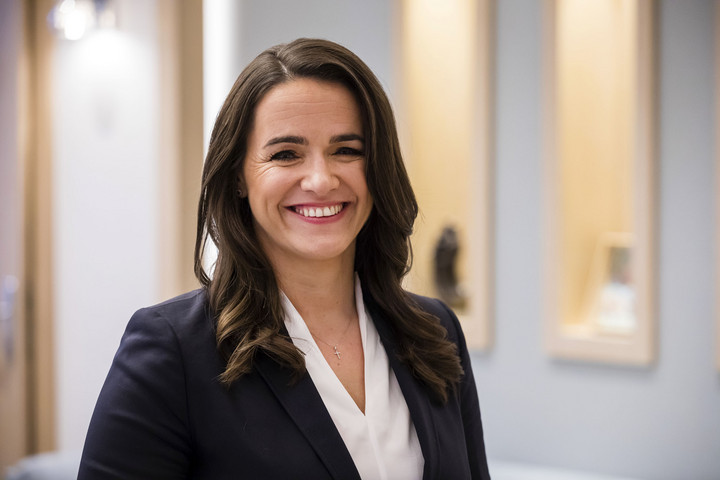The Hungarian parliament has voted to elect Katalin Novák as the country’s new president, with her new tenure marking the first female head of state the country has had since becoming a democracy in 1989.
Novák, the former minister for family affairs, was nominated by the ruling party, Fidesz and is set to replace János Áder, a quiet, yet, according to many, less charismatic president, who has spent his time in office championing environmental issues.
Novák had received 137 of the valid votes, her opponent, Péter Róna, nominated by the opposition parties, was able to muster only 51 votes.
The success of the ruling party candidate had surprised few, not only because her conservative supporters have a two-thirds majority in the Hungarian parliament, but also because her opponent, Róna, was the typical liberal intellectual inclined to hate his own homeland and who throughout his career is known for failing to ever utter a good word about Hungary or Hungarians in general. The Oxford educated academic once remarked that “I have come to the painful conclusion that this (Hungary) is not my homeland. Simply put, I do not belong here.”
Given his past remarks, it is rather ironic that he still decided to accept the nomination of the left-wing coalition to be the symbolic and constitutional head of all Hungarians.
On the contrary, Katalin Novák was one of the main architects of Viktor Orbán’s government’s child protection legislation, much maligned by the EU’s anti-nuclear family lobby, but hailed as remarkably successful in achieving its objectives. Judging by her introductory speech delivered in front of parliament, she will continue to be a president focusing on families and family-oriented policies. The other main topic of her presidency seems to be the Hungarian diaspora living in neighboring countries, such as Slovakia, Romania, and war-torn Ukraine.
In fact, she began her speech by a reference to the war in Ukraine, saying that the war launched by Russia “is indefensible and inexplicable.” Last week, she visited Transcarpathia (the Western border region of Ukraine) as the Goodwill Ambassador of the Hungarian Reformed Charity Service, which is a charity ran by the Hungarian Calvinist Protestant Church. In her speech, she mentioned that she felt it important to shown her support to the Hungarians who choose to stay in Ukraine, as well as to those who came recently as refugees to Hungary.
[pp id=8974]
On the general topic of conflict, Novák said that after the events of the global moral turmoil of the early 21st century, there is a greater need for spiritual renewal than ever.
“Hungarians want peace. We women do not want to win the war, we want to win the peace. Because you can thrive in peace, build, plan, smile at each other. As Mother Teresa said, ‘Peace begins with a smile,’” she added.
She then spoke of her role as a minister for families, saying that she is grateful for the 200,000 children that were born above the previous demographic trends thanks to her government’s family supporting policies. “As long as we have hands, we have free will, they cannot subdue us. That is the basis of our sovereignty. And the cradle of sovereignty is the family. I will never renounce our national sovereignty,” she remarked. She also pledged to support single parents, and parents raising children with long-term illnesses.
She promised to remain an active member of her church, and also referred to her Christian faith. In fact, this is not an accidental reference to her personal beliefs, but part of the Orbán government’s systemic support for the nation’s Christian roots as opposed to Western-style multicultural societies that give the same value to any and all faith systems that enter their countries due to migration. The Hungarian government has turned their belief in preserving their culturally homogeneous society into policies, and Novák’s speech is an indication that she will continue to be a willing promoter of these values while in office.
In her parliamentary speech she promised her support to members of the Hungarian community living in neighboring countries, but also mentioned the Roma community that numbers some 700.000 in Hungary. She had promised to visit Poland as her first destination abroad, which is seen as a reassurance from the part of the Hungarian government that the historic friendship, and political alliance between the two nations will continue despite their radically different stance on the current Ukrainian crisis.






